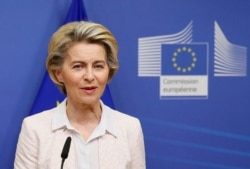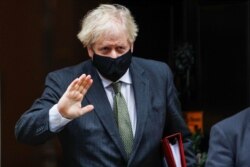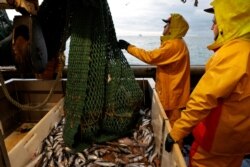The European Union had hoped to have been finished with Brexit months ago. But when leaders of the 27 member countries meet Thursday for a summit, they will have to once again consider what kind of future trade and security relationship they are prepared to have with Britain.
After four years and five months of often fractious talks, London and Brussels are down to the wire in their efforts to seal a deal that will avoid tariffs and reduce trade barriers between the bloc and Britain.
Both sides have much to lose if a deal has not been struck by the end of the year when Britain's exit transition period is over.
Serious consequences
Britain could be the bigger loser, as the EU is its biggest trading partner. But there will be serious economic repercussions for Ireland, France, Germany, the Netherlands and Belgium in the event of a no-deal.
"Brexit means both sides lose, but the United Kingdom loses considerably more," said Lisandra Flach, director of the Ifo Center for International Economics, a Munich-based research group.
European Commission President Ursula von der Leyen and British Prime Minister Boris Johnson will meet for dinner Wednesday in Brussels to try to break the impasse in the long-running talks.
Although neither side expects a deal to be struck over dinner, the future of Britain's relationship with the rest of Europe will largely be determined during the encounter. Progress would allow the stalled formal negotiations to resume later in the week.
The European Commission's chief spokesman said the pair will try to find a reason to "move forward, hopefully with negotiations, which could hopefully continue after that."
He added, "This is uncharted territory. We'll have to see how this meeting goes."
Speaking in the House of Commons before traveling to Brussels, Johnson said a "good deal is there to be done." But he added that the bloc is currently insisting on terms which no prime minister can accept.
Johnson reiterated that Britain would "prosper mightily" with or without a deal — a claim that many economists, as well as the governor of the Bank of England, dispute. They say Britain's companies, already reeling from the pandemic, would be hit hard.
A no-deal Brexit would reduce British output by about 6% in 2021 and lead to more than 300,000 Britons losing their jobs by the second half of the year, according to Britain's Office for Budget Responsibility, which produces formal economic forecasts for Downing Street.
On Tuesday, Johnson admitted securing a deal would be difficult.
"You've got to be optimistic. You've got to believe there's the power of sweet reason to get this thing over the line," he said. "But I've got to tell you, it's looking very, very difficult at the moment."
EU not hopeful
There is also pessimism on the EU side. Irish Prime Minister Micheal Martin told his country's Parliament on Wednesday there is only a 50% chance of a trade deal.
"At the moment, we are on the precipice of a no-deal," he said. "It remains to be seen how the principals — Prime Minister Boris Johnson and President of [the] Commission Ursula von der Leyen — can rescue the situation in their talks this evening."
Three large sticking points are holding up a deal: European fishing rights in British territorial waters; competition rules and government aid for companies; and how disputes between the bloc and Britain should be adjudicated.
Of these, the biggest disagreement is over regulatory alignment, with both sides at loggerheads over shared regulatory rules and competition standards to ensure businesses in Britain do not have an unfair advantage over their EU competitors.
Brussels insists that Britain should follow EU rules closely in areas such as workers' rights and environmental regulations.
"Our friends in the EU are currently insisting if they pass a new law in the future, which we don't comply with, they have the automatic right to punish us," Johnson told lawmakers Wednesday. "I don't believe those are terms any prime minister of this country should accept."
Johnson has said the whole point of Brexit is to break free from following EU common rules and to reassert national sovereignty. But EU officials say common rules are the price to pay for access to the bloc's so-called single market. They add that all trade treaties normally require a set of shared competition rules.
Johnson also is hedged in when it comes to the politics of his own ruling Conservative Party. If he compromises too much, he could face a revolt by a powerful Brexit caucus of hardline Conservative lawmakers, analysts say.
Michael Roth, German Minister of State for Europe, said there are still "fundamental differences" between the EU and Britain and said it is "still completely uncertain" if Johnson and von der Leyen will be able to bridge the divide.
Budget, coronavirus issues
Brexit is not the only thorny issue EU national leaders have to debate Thursday. Summiteers are due to return to another protracted fight over the bloc's multiyear budget and the conditions the EU has attached to the disbursement of a coronavirus recovery fund.
Hungary and Poland, with the backing of Slovenia, remain adamant in their refusal to approve the bloc's $2.1-trillion budget, while rule-of-law conditions remain in place for countries to receive money from a separate $750-million coronavirus recovery fund.
Brussels and western Europeans seem equally determined to leverage coronavirus relief money to force compliance with the democratic standards they say are necessary to block what they see as democratic backsliding by Hungary and Poland.
After weeks of intensive negotiations, Budapest and Warsaw are showing no signs of backing down or rolling back contentious reforms that, according to Brussels, threaten to curtail the independence of their judiciaries.







